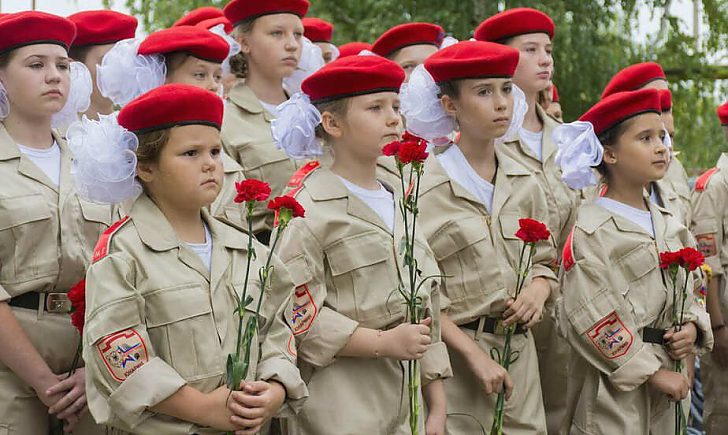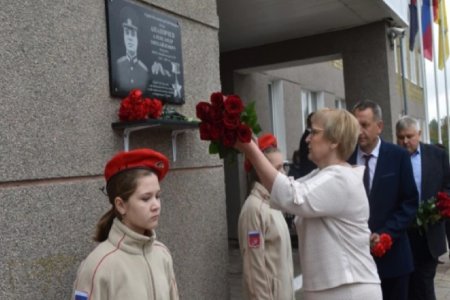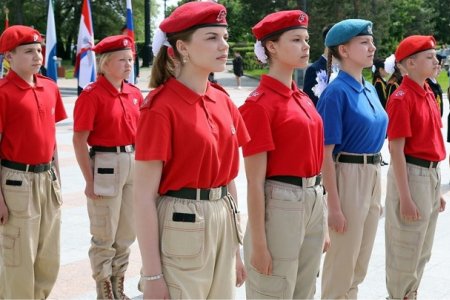
Ukrainian human rights groups sounded the alarm about Russia’s Yunarmia or ‘youth army’ soon after its creation in 2016. It was clear that this was yet another dangerous method for militarizing Ukrainian children and young people on occupied territory and trying to brainwash them into hating Ukraine and wanting to ‘defend Russia’. A recent study carried out by RFE/RL’s Schemes investigative journalists, on the basis of material from the Ukrainian hackers’ initiative Kib.Org, has demonstrated how these methods have been applied since the full-scale invasion of Ukraine, and named some of those young people brainwashed into going to fight against Ukraine.
Although the authors have focused solely on ‘Yunarmia’, other forms of militarization and indoctrination were used from 2014 in both occupied Crimea and Russia’s proxy ‘Donetsk and Luhansk people’s republics’ [occupied Donbas]. Children from occupied territory were sent to various ‘military-patriotic camps’ where young people were taught to use weapons and indoctrinated both into seeing military service as something ‘heroic’ and into seeing themselves as ‘Russians’ who should wish to ‘defend Russia’.
Yunarmia was created in 2016 by the then defence minister, Sergei Shoigu, with the ministry presenting it as being “supported by” Russian leader Vladimir Putin. Shoigu quite openly spoke of the Yunarmia movement being aimed at popularizing military ideology and fostering a special bond “between young Russians [sic] and the army”. Schemy quotes Yunarmia in saying that they want to create a positive attitude to what they claim is “carrying out ones constitutional duty and preparing youth to serve in the Russian armed forces.”
Russia began pushing Yunarmia in occupied Crimea without months of its creation, and the first event, reportedly involving 100 members, took place in Yevpatoria in November 2016. On the eve of its full-scale invasion of Ukraine, Russia was ‘boasting’ of 29 thousand children and young people in occupied Crimea having been ‘recruited’ into Yunarmia. The defence ministry mentioned, among “patriotic and educational events” and other activities, open days in military units and a ‘School of future commanders’ at the Artek children’s centre, which over 3.5 thousand children have so far been through.
The new study reports that the Crimean branch of Yunarmia is trying to broaden its activities and gain new members, with other recreational programs at Artek and Lasli summer camps on offer. In 2023, so-called ‘patriotic shifts’ were organized, with the participation of Yunarmia at such camps. Events included ‘a school for future commanders’.
Like Russia’s use of conscription and mobilization on occupied territory, all such efforts to encourage voluntary enlistment are in grave violation of international law. Article 51 of the (Fourth) Geneva Convention, which Russia is a partner to, unequivocally states that: “The Occupying Power may not compel protected persons to serve in its armed or auxiliary forces. No pressure or propaganda which aims at securing voluntary enlistment is permitted”.
Ukraine’s Prosecutor for Crimea and the Crimean Human Rights Group have lodged reports with the International Criminal Court and the Prosecutor has initiated criminal proceedings against the head’ of Yunarmia in Sevastopol, Volodymyr Kovalenko under Article 438 of Ukraine’s Criminal Code (violation of the laws and customs of war).
Even before the full-scale invasion, Russia was very clearly and deliberately creating an atmosphere of fear and aggression in occupied Crimea with Ukraine and Ukrainians presented as ‘the enemy’. They were, thus, not only encouraging children to want to ‘defend’ the aggressor state but brainwashing them into wanting to fight their own country and kill fellow Ukrainians.
There were serious grounds in occupied Crimea for suspecting that membership of Yunarmia was by no means voluntary, and the same is doubtless true of membership on any occupied Ukrainian territory.
Schemes reports that Yunarmia is now claiming to have 1.3 million members, with these including those illegally recruited from occupied Ukraine. Children as young as eight can join this ‘army’ by filling in a form on a mobile app.
They name one young man, 23-year-old Illya Zozulsky, a former member of, then instructor for Yunarmia, who is now fighting in the Russia army against Ukraine. The propaganda message is clear, and used as such by Russian media, but this was not necessarily a success story for Russian indoctrination, since the family obviously supported Russia from the beginning. The Russian report asserts that 80 such Yunarmia ‘instructors’ are fighting Russia’s war against Ukraine (referred to by Moscow’s euphemistic term ‘special military operation’).
In occupied parts of Donetsk and Luhansk oblasts, Yunarmia appeared officially only after Russia staged fake ‘referendums’ and illegally annexed the territory. In fact, they were there from 5 April 2019 when the so-called Donetsk people’s republic’ announced the formation of a militarized army ‘for children and young people’ called Molodaya Gvardia [Young Guard] – Yunarmia. Children and young people swore to be true to this illegal ‘republic’. The same processes were seen in the equally fake ‘Luhansk people’s republic’.
KibOrg found Yunarmia ‘houses’ in both occupied Donetsk and Luhansk in 2023. The premises were specially equipped for sports and weapon training on schoolgrounds, with these provided free of charge. The organization also managed to find details about ten children from occupied territory, most of whom were either members of Yunarmia or took part in this militarized formation’s events. They also found a large number of young people from occupied ‘Donetsk people’s republic [‘DPR’]’ and occupied parts of Zaporizhzhia oblast who had given ‘oaths of allegiance’.
One former Yunarmia member from ‘DPR’ who went on to fight against Ukraine’s Armed Forces was Stanislav Sikorsky from Horlivka (a city near Donetsk which has been occupied for ten years). Although the propaganda post on VKontakte about him is full of manipulative hype about ‘his fatherland’ being in danger and claiming that he volunteered, Russia was physically rounding up young men (or any men in occupied Donbas) in 2022. Claims that any individual, even one who had actively taken part in Yunarmia, ‘volunteered’ should possibly be treated with a degree of caution, especially since Sikorsky is said to have been ‘demobilized’ in 2023. He did not answer requests for contact from the journalists’ media partners. The latter were, however, able to contact a young woman called Hanna Lisovenko who had joined the ‘Spartans’, a division of Molodaya Gvardia – Yunarmia in 2017, when she was 17. She appears to be fighting against Ukraine, as a drone operator for a Russian military reconnaissance unit. The latter is mainly made up of ‘DPR’ militants who have been fighting against Ukraine since 2014.
Lisovenko told the media partners that she had been in Yunarmia and was now in the Russian army. She said that around half of those “who were studying with me chose a military path. Unfortunately many of them have already died. Some received serious injuries and can’t service. That is the reality of our region”. She added that her ‘training’ in Yunarmia had stood her in good stead and said that current Yunarmia members actively help “our fighters” (meaning by this those fighting against Ukraine).
The study concludes with details about the “Yunarmia offensive” on areas that have fallen under Russian occupation since the beginning of Russia’s full-scale invasion.
As reported, Russia began using ‘children’s camps’ where the children are clearly wearing Yunarmia caps within months of its seizure of Mariupol (in Donetsk oblast). The children, the Mariupol City Council reported, were being taught how “to shoot and to hate Ukraine”.
In occupied parts of Kherson and Zaporizhzhia oblasts, the first Russian ‘military-patriotic camps’ appeared in November 2022. At that time, Ivan Fedorov, Mayor of Melitopol, reported that the occupation authorities had claimed to have combined several Melitopol universities into one, and were forming Yunarmia units at this, “as future cannon fodder for the invaders’ army and security service”.
The first Yunarmia ‘centre of patriotic upbringing’ in occupied Kherson oblast was opened on the base of one of the Henichesk schools in October 2023.
The Yunarmia division in occupied Kherson oblast is run by Serafym Ivanov.
The first Yunarmia gathering in occupied Zaporizhzhia oblast took place in August 2023 with this local division led by Fidail Bikbulatov, a 30-year-old from Ufa, in the Russian Federation. Ukraine’s military intelligence accuses him of involvement in the mass abduction and forced deportation of Ukrainian children from occupied territory to the Russian Federation.
The material uncovered by KibOrg shows that, for Russia, one of the key criteria in assessing the effectiveness of Yunarmia centres is the number of Yunarmia members “mobilized into the Russian army”. In a mandatory annual competition, the Yunarmia winning headquarters will be those with the greatest number of Yunarmia members called up for military service or who have entered military academies, as well as the greatest number of Yunarmia members who entered military training centres.
As reported back in September 2024, residents of occupied parts of Donetsk and Luhansk oblasts reported then that there had been a worrying shift in Russia’s drive to get children and young people into Yunarmia. If once, the activities on offer could be treated as an opportunity to take part in exciting games and maybe get to competitions in Russia, over the last year, it had obviously become a platform for Russia to get new cannon fooder, with many former Yunarmia members having already died after signing contracts to fight in the Russian army.
See:
Russia’s ‘Youth Army’ used to get Ukrainians on occupied territory to fight against Ukraine



